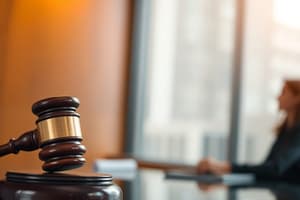Podcast
Questions and Answers
Explain the essential elements of a valid contract, and how does the absence of one element affect the contract's enforceability?
Explain the essential elements of a valid contract, and how does the absence of one element affect the contract's enforceability?
The essential elements include offer, acceptance, consideration, capacity, intention to create legal relations, and legality of object. Absence of any element generally renders the contract void or voidable.
Differentiate between 'goods' and 'services' under the Sale of Goods Act, providing examples of each and explaining why this distinction matters in commercial transactions.
Differentiate between 'goods' and 'services' under the Sale of Goods Act, providing examples of each and explaining why this distinction matters in commercial transactions.
Goods are tangible, movable property; services are intangible activities. The Sale of Goods Act applies to goods, not services, thus governing different aspects of the transaction.
Explain the concept of 'separate legal entity' in the context of a joint stock company and discuss its implications for the company's liabilities and the personal liabilities of its shareholders.
Explain the concept of 'separate legal entity' in the context of a joint stock company and discuss its implications for the company's liabilities and the personal liabilities of its shareholders.
A company is a separate legal entity from its shareholders, meaning it can own property, enter contracts, and be sued in its own name. Shareholders generally have limited liability, only risking their investment.
Describe the 'polluter pays' principle within the context of the Air Pollution Act and discuss how this principle is implemented and enforced to address environmental damage caused by industrial activities.
Describe the 'polluter pays' principle within the context of the Air Pollution Act and discuss how this principle is implemented and enforced to address environmental damage caused by industrial activities.
Explain how a company's value system impacts its organizational culture and management practices, providing examples of how ethical values can influence decision-making and stakeholder relationships.
Explain how a company's value system impacts its organizational culture and management practices, providing examples of how ethical values can influence decision-making and stakeholder relationships.
Explain the doctrine of quantum meruit and illustrate with an example how it applies when a contract is incomplete or has been terminated, but one party has already rendered services.
Explain the doctrine of quantum meruit and illustrate with an example how it applies when a contract is incomplete or has been terminated, but one party has already rendered services.
Summarize the key implications of the principle of caveat emptor for buyers and sellers in a transaction, and discuss how modern consumer protection laws have modified this principle.
Summarize the key implications of the principle of caveat emptor for buyers and sellers in a transaction, and discuss how modern consumer protection laws have modified this principle.
Outline three key distinctions between a private limited company and a public limited company, focusing on their formation, fundraising capabilities, and regulatory compliance requirements.
Outline three key distinctions between a private limited company and a public limited company, focusing on their formation, fundraising capabilities, and regulatory compliance requirements.
Explain the legal definition of 'bailment' and give an example of a common bailment scenario. What are the fundamental duties of a bailee in the context of bailment?
Explain the legal definition of 'bailment' and give an example of a common bailment scenario. What are the fundamental duties of a bailee in the context of bailment?
Describe the functions of consumer redressal machinery under the Consumer Protection Act? How does this machinery empower consumers to resolve disputes?
Describe the functions of consumer redressal machinery under the Consumer Protection Act? How does this machinery empower consumers to resolve disputes?
Flashcards
Define Contract
Define Contract
A legally binding agreement between two or more parties.
Define 'goods' as per Sale of Goods Act
Define 'goods' as per Sale of Goods Act
Every kind of movable property other than actionable claims and money; includes stock and shares, growing crops, grass, and things attached to or forming part of the land.
Define Partnership Firm
Define Partnership Firm
A business organization in which two or more individuals agree to share in the profits or losses of a business.
Joint Stock Company
Joint Stock Company
Signup and view all the flashcards
Statutory Company
Statutory Company
Signup and view all the flashcards
Air Pollution Act
Air Pollution Act
Signup and view all the flashcards
Value System
Value System
Signup and view all the flashcards
Quantum Meruit
Quantum Meruit
Signup and view all the flashcards
Caveat Emptor
Caveat Emptor
Signup and view all the flashcards
Consumer Dispute
Consumer Dispute
Signup and view all the flashcards
Study Notes
- The exam is for Bachelor of Business Administration (BBA) IV-Semester (CBCS).
- The subject is Business Law and Ethics.
- The exam duration is 3 hours.
- The maximum marks are 80.
Part A (5 x 4 = 20 Marks) - Short Answer Type
- Answer any five of the following questions:
- Define Contract.
- Explain the term 'goods' as per Sale of Goods Act.
- Define partnership firm, Joint stock company and statutory company.
- Explain Air Pollution Act-Importance.
- Explain the value system. Explain its relevance in management.
- Define Quantum Meruit.
- Define Caveat Emptor.
- Explain the distinction between private and public limited company.
Part B (5 x 12 = 60 Marks) - Essay Answer Type
- Answer all the questions using the internal choice:
- Discuss the statement 'All contracts are agreements but all agreements are not contracts'.
- OR, explain different types of contracts.
- Define bailment and discuss the duties and rights of bailor and bailee.
- OR, explain and distinguish between bailment and pledge.
- Define a 'company' and state its objectives and characteristics.
- OR, explain different types of companies.
- Define consumer dispute and write a note on consumer redressal machinery under the Consumer Protection Act.
- OR, X got a confirmed ticket with AP Tourism bus, which was cancelled later due to a technical defect, providing an alternative arrangement to the customer; determine if it is a deficiency in service.
- Write briefly about ethical and value based consideration.
- OR, write in detail about business ethics and efficiency.
Studying That Suits You
Use AI to generate personalized quizzes and flashcards to suit your learning preferences.



